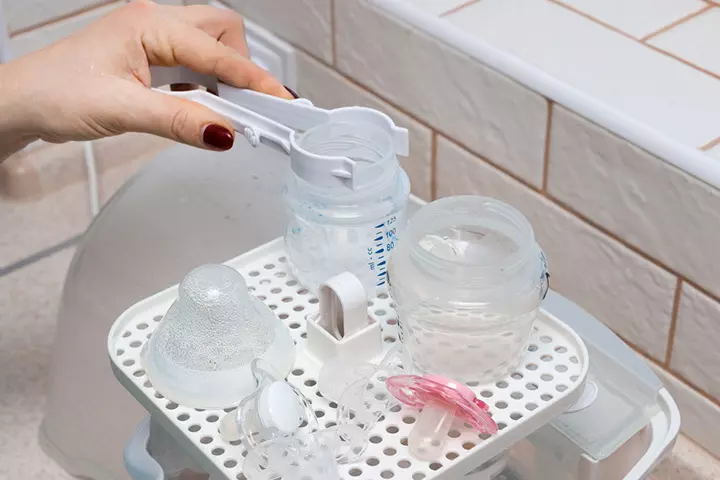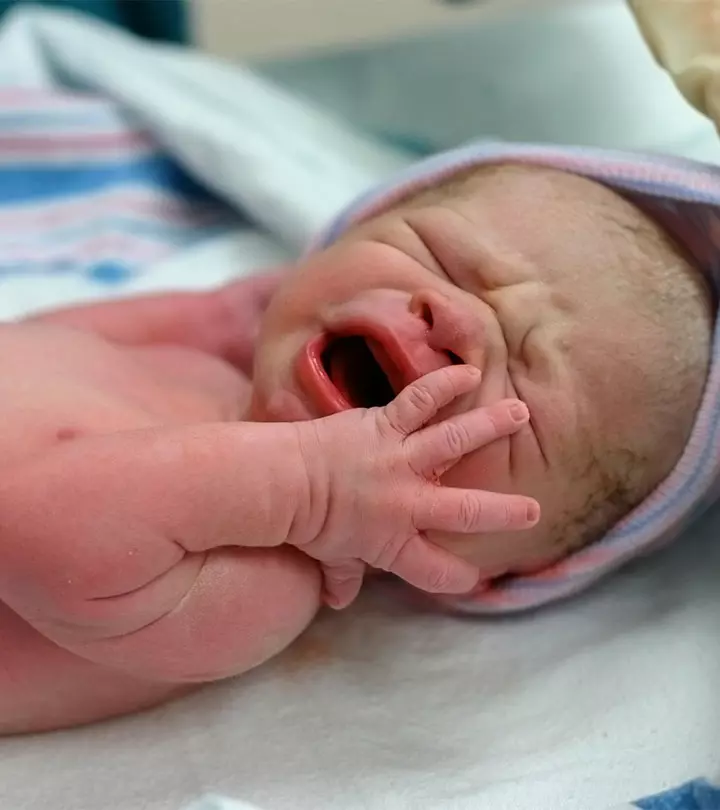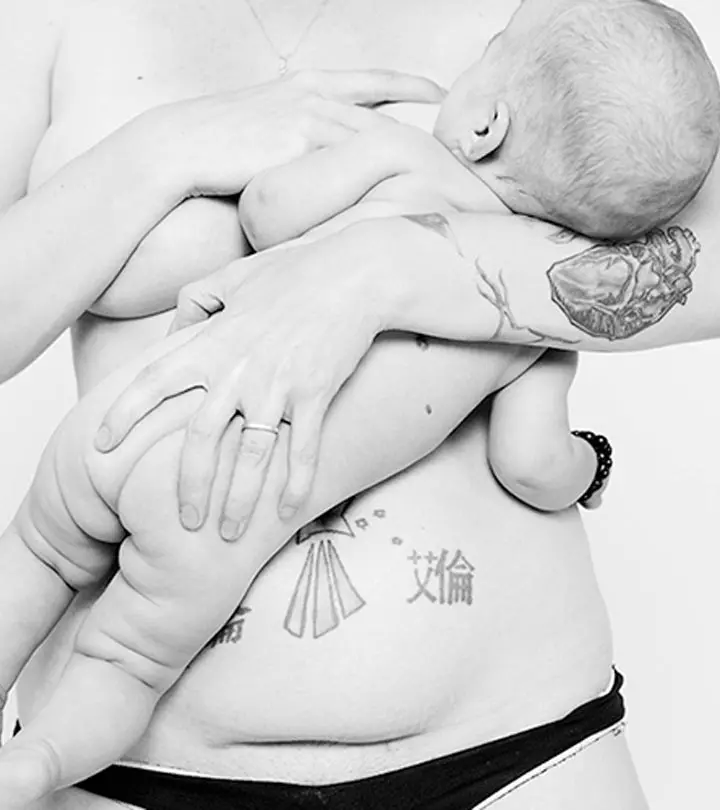
Image: Shutterstock
If you’re a new mom, you’re probably getting to hear a lot of advice on breastfeeding— what you should and shouldn’t do, how often to feed, and everything in between. It is common knowledge that mother’s milk is the most nutritious food for a baby. It helps build your little one’s immunity and contributes towards healthy growth and brain development (1). It also helps in establishing a close bond between you and your child. However, breastfeeding is not easy; often being uncomfortable and painful to the mother. And while the advice from people having experience helps, too many of them can leave us just more confused. So, let us help you in listing out the important dos and don’ts so that you can refer to them in one place:
Do: Feed Your Baby Right After Birth

Image: IStock
The earlier you initiate breastfeeding, the better it is. Whenever possible, babies should be breastfed within an hour of being born (2). In cases where the mother is not ready to nurse her child immediately, at least ensure breastfeeding within 24 hours. Early breastfeeding also ensures the much-needed intimacy that a newborn may be craving.
Do: Warmth, Love, And Massages

Image: IStock
When stimulated and given good care, the breasts will produce milk in good quantity. Taking a warm shower before feeding works great for many mothers. It gently warms the body including the breasts. A refreshing bath also lifts the mood which can have an effect on your milk production. Another great way to improve the flow of milk is by massaging the breasts. A good massage can help ease the tight spots improving the flow of milk. You can do it yourself, with your fingers gently moving from the middle of the chest towards the shoulders. If you’re not feeling up for it, you can also ask your partner to lend a helping hand. Repeat the massage once after feeding too.
Do: Look For A Peaceful Place

Image: IStock
Your baby can easily be distracted by noise and disturbances. So, when you’re breastfeeding, make sure you find a peaceful place. A quiet, safe, and private spot works the best (at least in the beginning stages, until your infant latches on). When you relax, your baby will too. It makes it easier for the little one to feed when you are in a comfortable and relaxed state.
Do: Change The Diaper

Image: IStock
When you’re feeding your baby, ensure that their diapers are clean. A wet or soiled diaper will only make your baby uncomfortable, distracted and cranky, which might affect their feeding process. Always ensure that your baby’s diapers are clean, dry, and fresh before you begin breastfeeding.
Do: Clean Your Breasts

Image: IStock
You must clean your breasts before and after your feeding sessions. You can use a warm washcloth to gently wipe your breasts to keep them clean and to remove any traces of sweat, oil, lotion, or perfume. After you’re done feeding, there might be some residual milk on your nipples and areola. You must wipe them again and keep the area clean.
Do: Put The Whole Thing In

Image: IStock
We’re talking about your breasts, but don’t be alarmed. You must put the areola (the dark-colored area around the nipple) into your baby’s mouth. Allowing your baby to suckle on your nipples only might not stimulate the milk flow completely. Therefore, put it all in! It might hurt you for a few days, but you’ll get used to it, and so will your baby.
Now, let’s quickly move on to the “Don’ts” of breastfeeding:
Don’t: Wait For The Baby To Cry

Image: IStock
It’s advisable to feed your baby regularly instead of waiting for them to cry out of hunger, which is usually the final stage. You don’t want your baby to starve, so keep an eye out and feed them regularly. If you follow the on-demand feeding technique, watch out for signs that include your baby licking their lips or sticking their tongue out.
Don’t: Forget To Sterilize Everything

Image: IStock
Sterilization is not restricted only to feeding bottles or when feeding formula. it’s crucial that you sterilize any device and accessories you use while breastfeeding, including breast pumps, breast shields, etc.
Don’t: Miss Out On Drinking Water

Image: IStock
We cannot stress this enough — drink plenty of water! You have to stay hydrated throughout your breastfeeding days. It’s essential because your body needs water to produce milk. A good idea would be to drink a glass of water (or two) before you begin breastfeeding.
Don’t: Ignore Your Diet

Image: IStock
A well-balanced diet with healthy and nutritious food is vital for every breastfeeding mother. Your body requires nutrition and energy to produce milk for your little one. Therefore, eat well and eat right. Also, remember that whatever you consume is transferred to your baby through the milk. So, be mindful of what you eat.
Don’t: Eat Spicy Food

Image: IStock
You might be a fan of spicy food, and those devil chilly chicken wings might be your all-time favorite, but while breastfeeding, steer clear of spicy foods. Your milk will have a slight tinge of the flavors you consume, and anything too spicy is not suitable for your baby.
Don’t: Compromise On Hygiene

Image: Shutterstock
Infants are prone to diseases and infections, and it’s better to ensure a clean and hygienic environment for them. Make sure that the clothes and sheets you put on your baby are regularly washed and kept clean. Mothers too need to keep themselves clean and wear clean clothes. Seek help from your partner in keeping the household free of dust and dirt at all times.
Don’t: Ignore The Pain

Image: IStock
A slight amount of pain is common while breastfeeding. However, if your nipples are too sore or you’re experiencing a lot of pain and discomfort, consult your doctor immediately. You could also speak to a lactation expert who can guide you through the process.
Breastfeeding is a magical experience for any woman. But it takes time and patience to get it right because it’s different for every woman. Therefore, don’t give up if you don’t get it right on the first go. Keep trying, and you’ll succeed. Do you have any breastfeeding tips for new moms that you’d like to share with us? Let us know in the comments below!
References
- The Science Of Breastfeeding And Brain Development
https://www.ncbi.nlm.nih.gov/pmc/articles/PMC5651963/ - Breastfeeding From The First Hour Of Birth: What Works And What Hurts
https://www.unicef.org/stories/breastfeeding-first-hour-birth-what-works-and-what-hurts
Community Experiences
Join the conversation and become a part of our nurturing community! Share your stories, experiences, and insights to connect with fellow parents.












